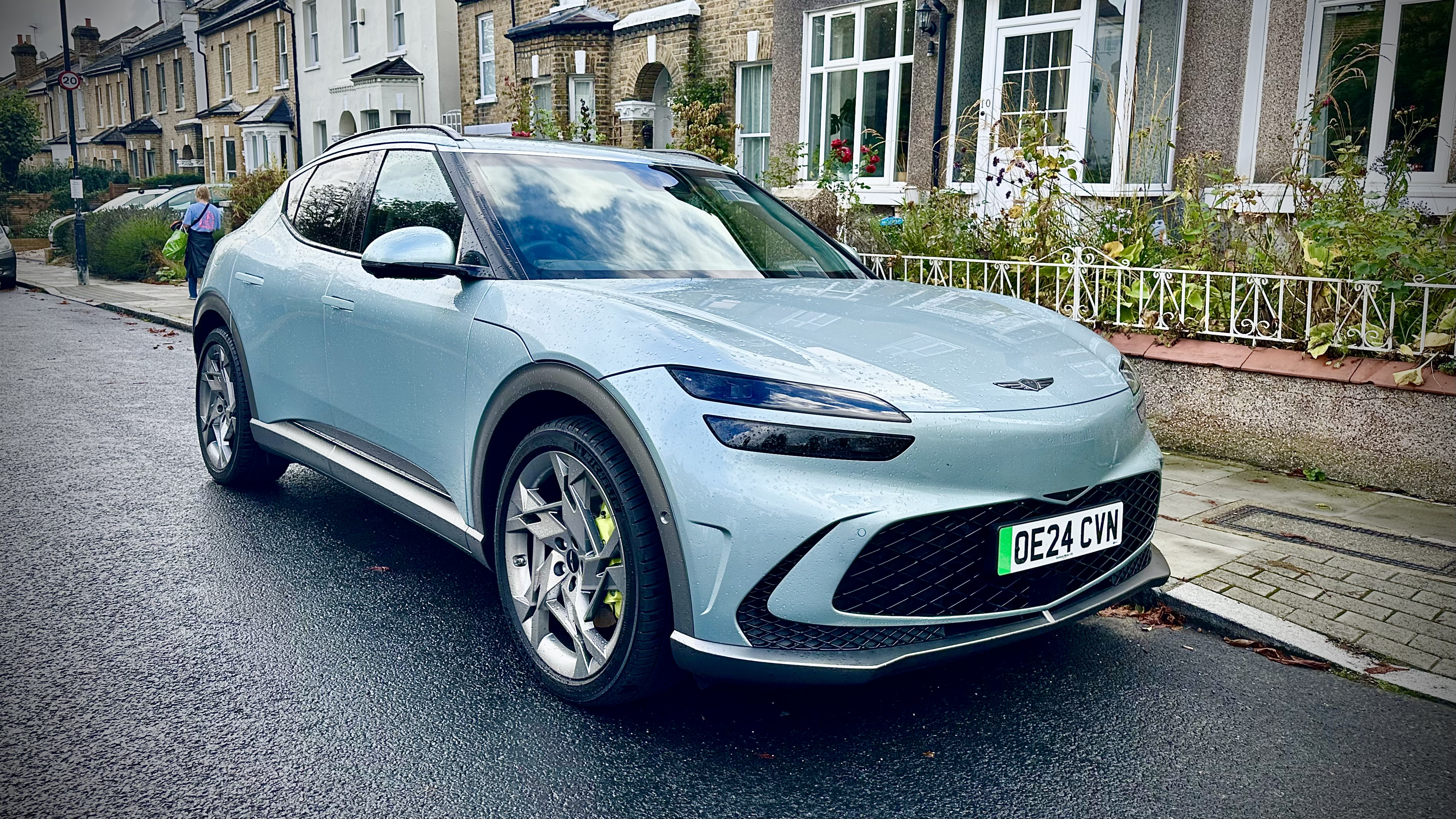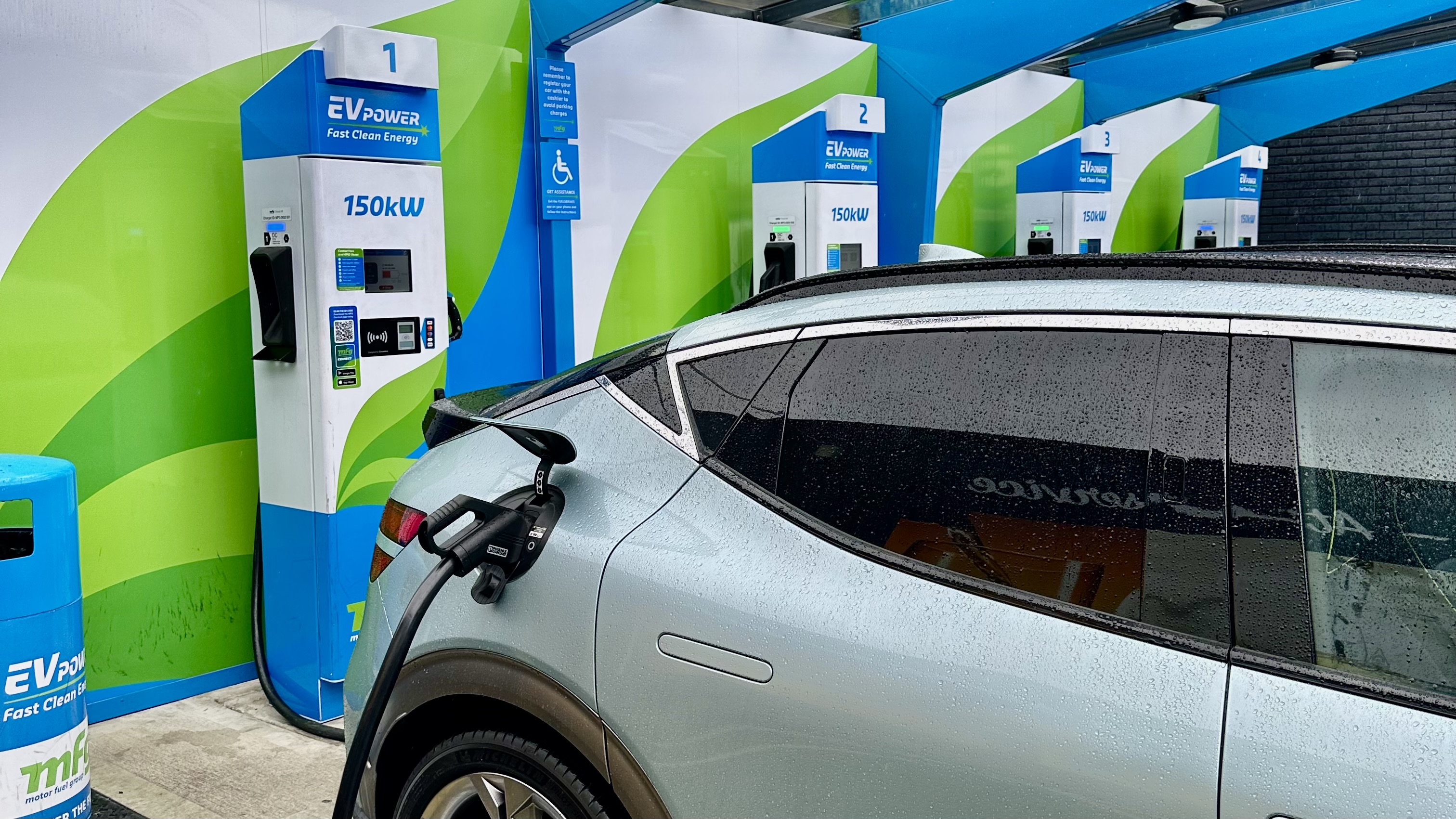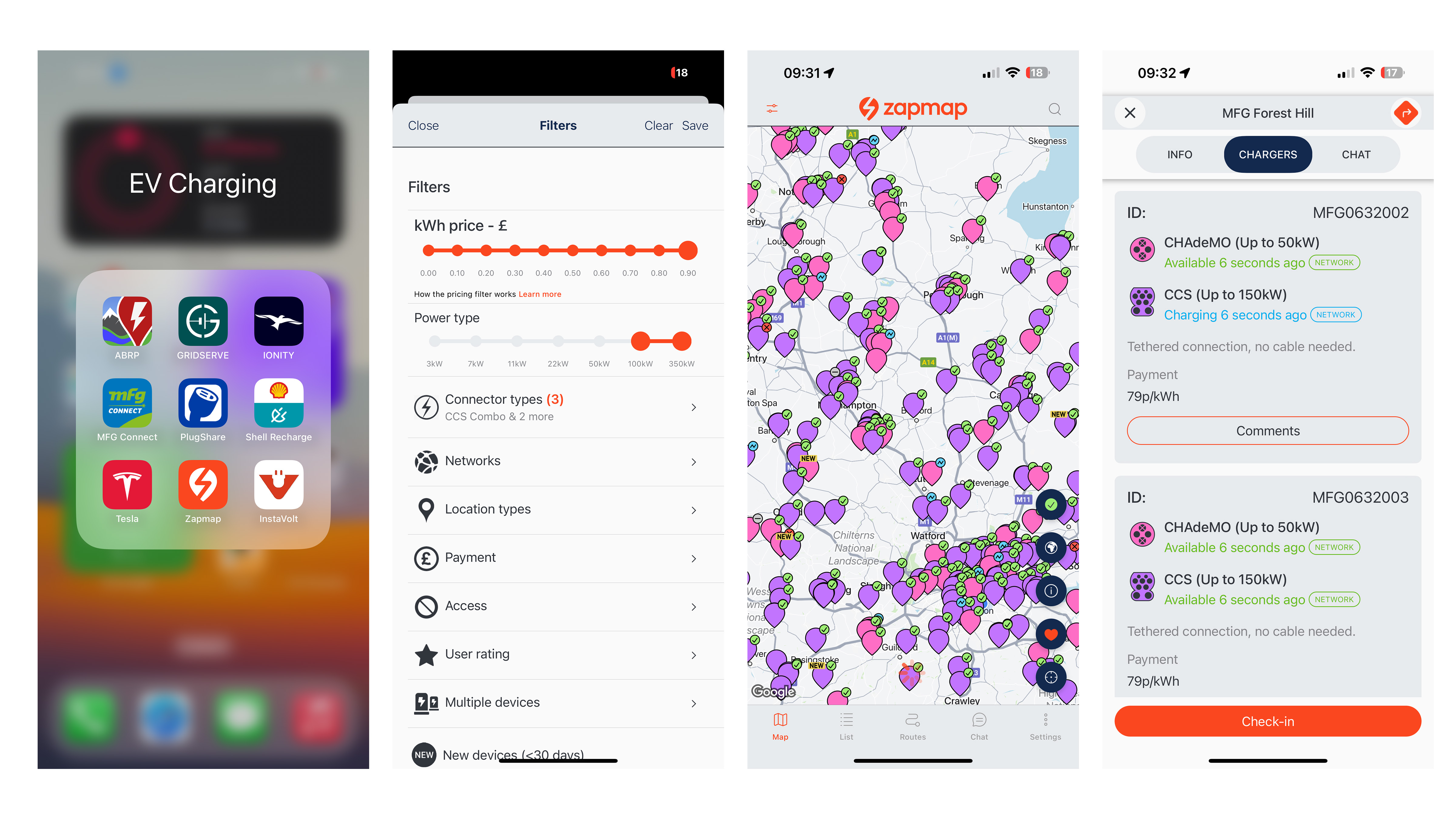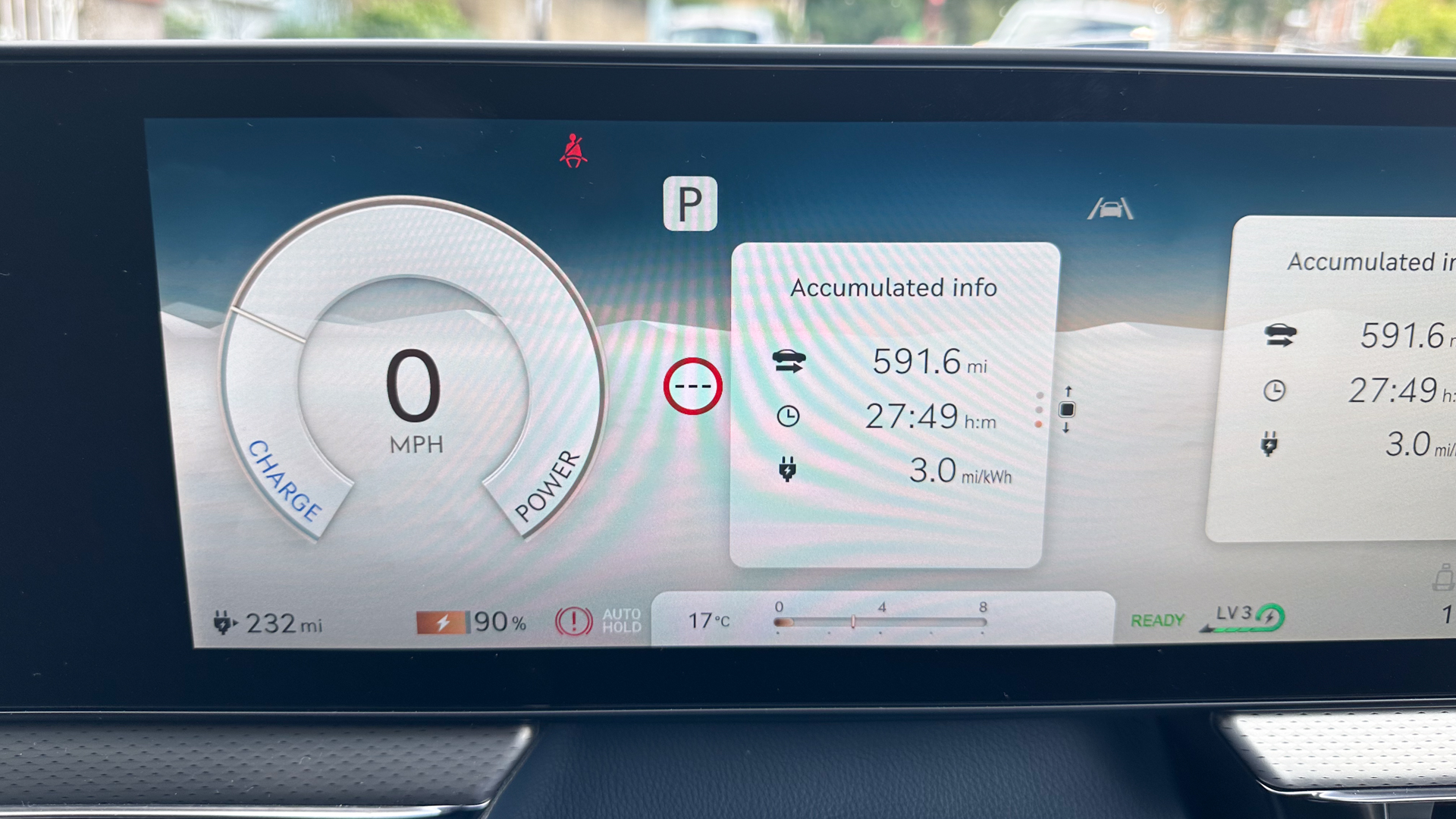

QUICK SUMMARY
We're one month into our long-term review of the Genesis GV60 and our phone is already packed full of charging apps.
If you’ve just bought your first Electric Vehicle (or EV) then, chances are, you’re also the new owner of an entire folder full of smartphone applications. And if that isn’t you, well, it will be soon enough.
This was the first thing I did after taking delivery of a Genesis GV60. But unlike most car reviews, which tend to involve a loan period of up to seven days, the Genesis is what we call a long-termer, and it’ll be in my possession for six months. This means I can’t get away with changing it once (if at all) and handing back the keys a few days later.
Instead this is a car to live with – and because it’s electric, the first task is downloading all those apps. The need for a comprehensive selection of charge stations maps and EV route planners – which is essentially what the apps are – is because I don’t have a home EV charger . We have off-road parking here (rare in London), but no charger, so knowing where to fill the battery is crucial.

Can you use an EV without a home charger?
Yes, is the short answer. You probably drive a petrol car without also owning an oil refinery. But the relative scarcity of charge stations, compared with petrol stations, combined with their varying speed and high cost compared to plugging it at home can make a wallbox charger seem like an essential purchase.
You can manage without, but after just a week of driving I was shocked – no pun intended – at how expensive public charge stations can be. My closest high-speed charger is by MFG and it sits beside a petrol station.
The chargers always work perfectly, there’s never a queue, and they fill the Genesis at up to 150 kW, which is properly quick. I rarely need plug in for more than 15 or 20 minutes. But they cost £0.79 per kWh. This means filling the GV60’s 77.4 kWh battery from empty would cost around £60, and that’ll be good for a claimed range of about 290 miles. Not cheap, but convenient and really quick.
Zapmap

Back to all those phone apps. Zapmap is what you need when you’re hunting for a charger. This brilliantly shows almost every public charger, along with its speed, connection type, availability, exact location (plus notes on how to access it, if needed), cost, and reports of recent problems left by fellow EV drivers.
Sign up to the T3 newsletter for smarter living straight to your inbox
Get all the latest news, reviews, deals and buying guides on gorgeous tech, home and active products from the T3 experts
This huge database can be filtered to weed out very slow chargers and help you find the best option for your EV. I have my app set to only show chargers capable of 100 kW or more, and at any cost. It all works really well and, honestly, it serves to demonstrate just how many high-speed chargers the UK now has. It's a very different situation compared to just a few years ago.
We're now at a point where, unless you’re in the wilds of the Scottish Highlands, you can look for charge stations almost like you would a petrol station. I took the GV60 up to Oxfordshire for a work event and, knowing I only had just enough range to get there, being on the M40 I was bound to be near to a rapid charger – and I was. A quick check of Zapmap revealed a couple of high-speed options within range. It was admittedly tight, and I plugged in with just 10 percent remaining, but it was proof that the system worked. And that was all without asking the car to find a charger for me, which I'll come to in a future report.
What about those lamp post chargers?
You might have spotted EV chargers fitted to lamp posts. From a technical standpoint, these are a fantastic idea. They make use of existing electrical infrastructure to deliver power exactly where your EV needs it, right next to where it is parked. They charge slowly, which is fine if you’re parked there overnight. But they are also expensive.
There’s one right outside my flat, but it costs 61p per kWh (plus a 12p connection fee per use) for most of the day. Only between midnight and 7am is it cheaper, at 40p per kWh hour (plus the 12p connection fee). Fill the Genesis GV60 and that’ll cost about £47 during the day or £31 at night.
That’s much better than the rapid charger down the road, but this charger only operates at 5 kW, so it’ll take more than 12 hours to fill the car from almost empty. Handy for a top-up if you’re visiting friends and can plug in for a few hours, but not a permanent solution. And because it’s on a public street with no parking restrictions, anyone can park any vehicle next to the charging lamp post. As I type this, the charger is available but a petrol car is parked in front of it.

As for the GV60 itself, I am really enjoying living with a sensible-sized, family-friendly car full of the sort of refinement and technology my own Mazda MX-5 lacks. The Genesis shares its electric platform with the equally impressive Kia EV6 and Hyundai Ioniq 5, so it benefits from the same ultra-rapid charging abilities – and since this GV60 is the Sport Plus model, it has masses of power and straight-line performance too. This is rarely needed, but it's amusing all the same.
Lastly, some housekeeping. In my first month with the Genesis I’ve driven 592 miles and the car has achieved an average efficiency of 3.0 miles per kWh. Multiply this by the battery capacity and you get an approximate real-world range of 232 miles.
But the weather has been pretty good since the GV60 arrived in August. Now the autumn is here and temperatures are set to fall, it’ll be interesting to see how the GV60’s efficiency fluctuates through the colder months ahead.
Alistair is a freelance automotive and technology journalist. He has bylines on esteemed sites such as the BBC, Forbes, TechRadar, and of best of all, T3, where he covers topics ranging from classic cars and men's lifestyle, to smart home technology, phones, electric cars, autonomy, Swiss watches, and much more besides. He is an experienced journalist, writing news, features, interviews and product reviews. If that didn't make him busy enough, he is also the co-host of the AutoChat podcast.
-
 A new age of humanity wins the Sony World Photography Awards 2025
A new age of humanity wins the Sony World Photography Awards 2025Zed Nelson's Anthropocene Illusion highlights the influence of humans on the environment and the artificial spaces left for wildlife in a powerful set of images to win this year's SWPA Photographer of the Year
By Mat Gallagher
-
 How to watch Mario Kart World Direct – everything you need to know about the Switch 2 launch game
How to watch Mario Kart World Direct – everything you need to know about the Switch 2 launch gameNintendo will host a new Nintendo Direct presentation this week, here's how to watch it live and what to expect
By Rik Henderson